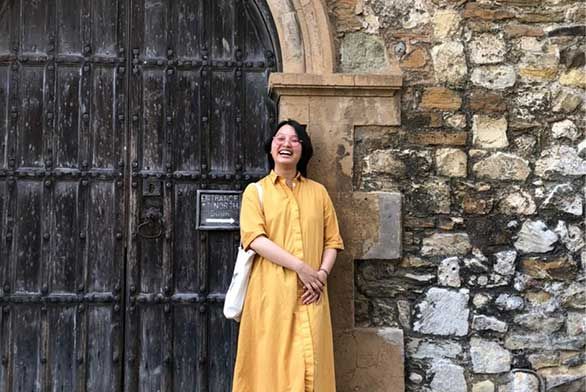Eunbee Yu (A18) Shares Her Experiences with Alternative Education in South Korea—and Beyond
November 8, 2024 | By Catherine Darling Fitzpatrick (SF16)
Eunbee Yu’s (A18) educational experience in South Korea and abroad was as varied as it was unconventional. It began with home-schooling through fourth grade, followed by a stint at an English-speaking private missionary school before pivoting back to private instruction in middle school. By ninth grade, Yu and her parents were ready for something different, so when Soopna—a small alternative K-12 school in Seoul—opened, Yu became one of its very first students. She loved its innovative approach to education so much that after college graduation, she returned to Soopna as a teacher. This time around, she had something new to teach them: the St. John’s-style seminar.

Yu initially chose to attend St. John’s for college because she was drawn to its focus on classical literature and discussion-based learning. Studying abroad in the U.S. also held appeal for her. But despite years of English training, the transition wasn’t easy. “There was this shell-shock on the faces of all the international students during the first week,” she recalls of her early time at St. John’s. “At first, you have to choose between talking and listening.” Mathematics—a universal language— provided some comfort, offering a structured approach that helped her prepare for class presentations.
Yu gradually found her footing thanks to a supportive campus community. “A lot of learning at St. John’s happens outside the classroom,” she says. “Students would gather after seminars to share notes and keep the discussions going. This wasn’t something I’d seen before, and it made all the difference.” Yu managed to balance her academic and social life by catching up on reading in the library before heading to a party, only to return home and read some more. “Sometimes, the party actually helped with the reading because everyone was talking about the same books,” she says.
By the time Yu graduated from St. John’s, she had spent three years in Annapolis, and one year —her junior year—in Santa Fe. Yu’s connection to the classics deepened during this time, with Plato’s Republic becoming a particularly influential text for her. The philosophical dialogue “changed how I see society and the way it runs,” she says. “It made me question the fundamentals behind our social mechanisms—what myths and stories underpin these systems? Is there an alternative story we could embrace to change the way things are?”
For Yu’s senior essay, she opted to explore fictional and satirical critiques of societal norms by focusing on Jonathan Swift’s Gulliver’s Travels. In the book’s final part, Gulliver’s time among the fictional Houyhnhnm horse-people profoundly alters his view of human society; Yu was interested in the ways Gulliver’s experiences as a social outsider informs said outlook.
Books like these at St. John’s taught Yu the importance of creating an “alternative story” to galvanize a population and inspire lasting political change, which she today applies to her career working with youth. “The current narrative for many South Korean students and their parents is ‘if you don’t compete, you are a failure,’” she says. South Korea’s education system is notoriously rigorous, with private extracurricular tutoring almost a given. “When I was young, after school didn’t mean the end of learning,” Yu says. “There was always another lesson—math, swimming, piano, English. Now, kids even go to coding lessons after school.”
Educational institutions like Soopna provide a respite by offering a far different experience than the ones at most South Korean schools. For one, the school readily adopted the St. John’s Great Books program into a seminar-style class for more mature students at Soopna when Yu returned as a teacher. And with its small size, Soopna—which, in 2021, had just 80 students—groups its pupils by skill level rather than age, allowing for smaller classes and a personalized learning experience. This provides an environment where “students can really engage with what they’re learning—they’re not just memorizing facts,” Yu explains.
Yu left Soopna in 2024 and today works with the YWCA—a career shift that she hopes will allow her to continue combatting the pervasive notion that rivalry among youth in South Korea is the sole path to success. “The competitiveness starts in school, continues into college, and then keeps right on going in the workplace. It never ends,” she says.
She is far from alone in feeling this way: Interest in independent schools like Soopna is growing in South Korea, although they currently receive minimal government support, plus their graduates must undergo additional standardized testing before attending a Korean university. Despite these hurdles, Yu believes these schools offer a crucial alternative for students seeking a different style of learning—including, thanks to her, long discussions about great books.

